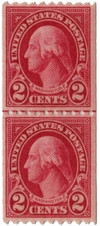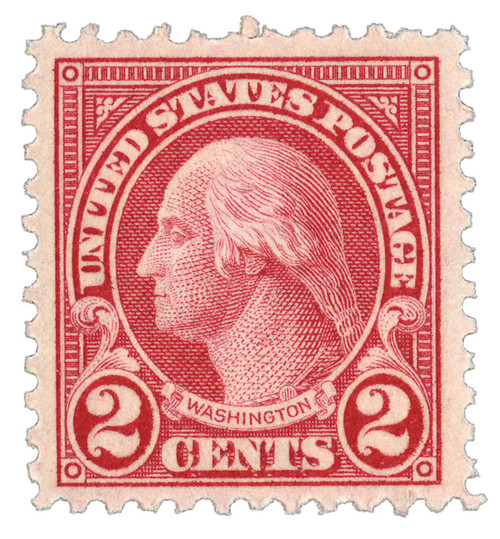
# 606a - 1923 2c Washington , coil carmine lake
U.S. #606a
1923-29 Rotary Coil
2¢ Washington
Issue Date: December 31, 1923
First City: Washington, DC
Printed by: Bureau of Engraving and Printing
Printing Method: Rotary Press
Perforation: 10 horizontally
Color: Carmine Lake
US #606 was issued in carmine, but a small number were found in the carmine lake color, which has a more bluish or purplish hue compared to the regular carmine. Stamps with the carmine lake color are identified as #606a and are scarcer than #606.
Wheels of Progress
In 1847, when the printing presses first began to move, they didn’t roll – they “stamped” in a process known as flat plate printing. The Regular Series of 1922 was the last to be printed by flat plate press, after which stamps were produced by rotary press.
By 1926, all denominations up to 10¢ – except the new ½¢ – were printed by rotary press. For a while, $1 to $5 issues were done on flat plate press due to smaller demand.
Produced by rotary press, US #606a features the same design as US #554 of the Series of 1922-25, which was created by flat plate printing. It also features the same design as the rotary press US #599 with vertical perforations; however, US #606 has horizontal perforations.
U.S. #606a
1923-29 Rotary Coil
2¢ Washington
Issue Date: December 31, 1923
First City: Washington, DC
Printed by: Bureau of Engraving and Printing
Printing Method: Rotary Press
Perforation: 10 horizontally
Color: Carmine Lake
US #606 was issued in carmine, but a small number were found in the carmine lake color, which has a more bluish or purplish hue compared to the regular carmine. Stamps with the carmine lake color are identified as #606a and are scarcer than #606.
Wheels of Progress
In 1847, when the printing presses first began to move, they didn’t roll – they “stamped” in a process known as flat plate printing. The Regular Series of 1922 was the last to be printed by flat plate press, after which stamps were produced by rotary press.
By 1926, all denominations up to 10¢ – except the new ½¢ – were printed by rotary press. For a while, $1 to $5 issues were done on flat plate press due to smaller demand.
Produced by rotary press, US #606a features the same design as US #554 of the Series of 1922-25, which was created by flat plate printing. It also features the same design as the rotary press US #599 with vertical perforations; however, US #606 has horizontal perforations.











